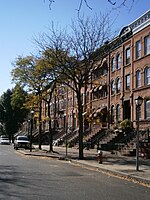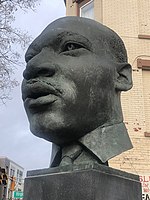Sacred Heart Church (Jersey City, New Jersey)
20th-century Roman Catholic church buildings in the United StatesChurches in Jersey City, New JerseyFormer Roman Catholic church buildingsNeoclassical architecture in New JerseyNeoclassical church buildings in the United States ... and 6 more
New Jersey church stubsRalph Adams Cram church buildingsRoman Catholic Archdiocese of NewarkRoman Catholic churches completed in 1924Roman Catholic churches in New JerseyUnited States Roman Catholic church stubs
Sacred Heart Church is a historic church and former Roman Catholic parish church on MLK Drive at Bayview Avenue in the Greenville section of Jersey City, New Jersey, United States. It is within the Archdiocese of Newark.
Excerpt from the Wikipedia article Sacred Heart Church (Jersey City, New Jersey) (License: CC BY-SA 3.0, Authors).Sacred Heart Church (Jersey City, New Jersey)
Bayview Avenue, Jersey City
Geographical coordinates (GPS) Address External links Nearby Places Show on map
Geographical coordinates (GPS)
| Latitude | Longitude |
|---|---|
| N 40.7066 ° | E -74.0832 ° |
Address
Sacred Heart Church
Bayview Avenue
07305 Jersey City
New Jersey, United States
Open on Google Maps







